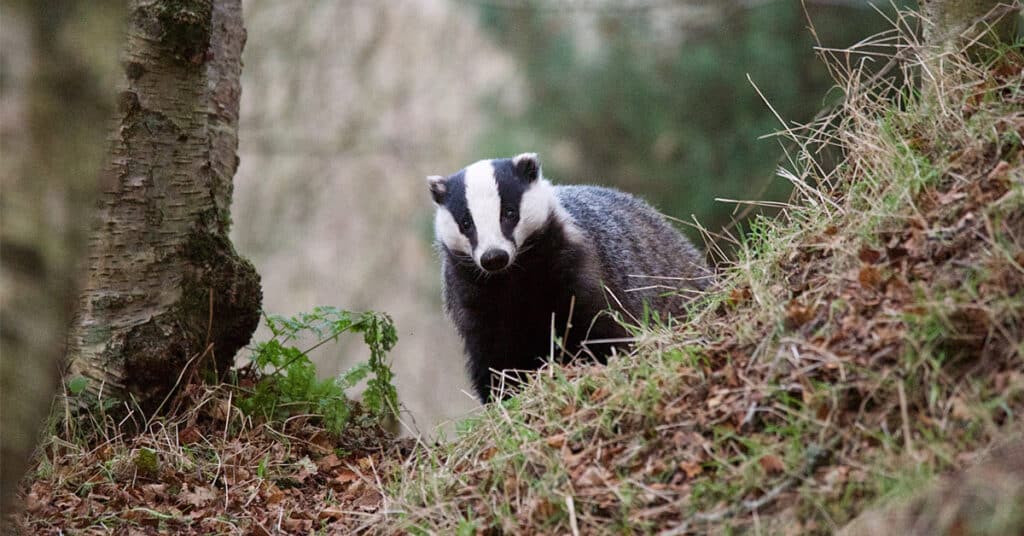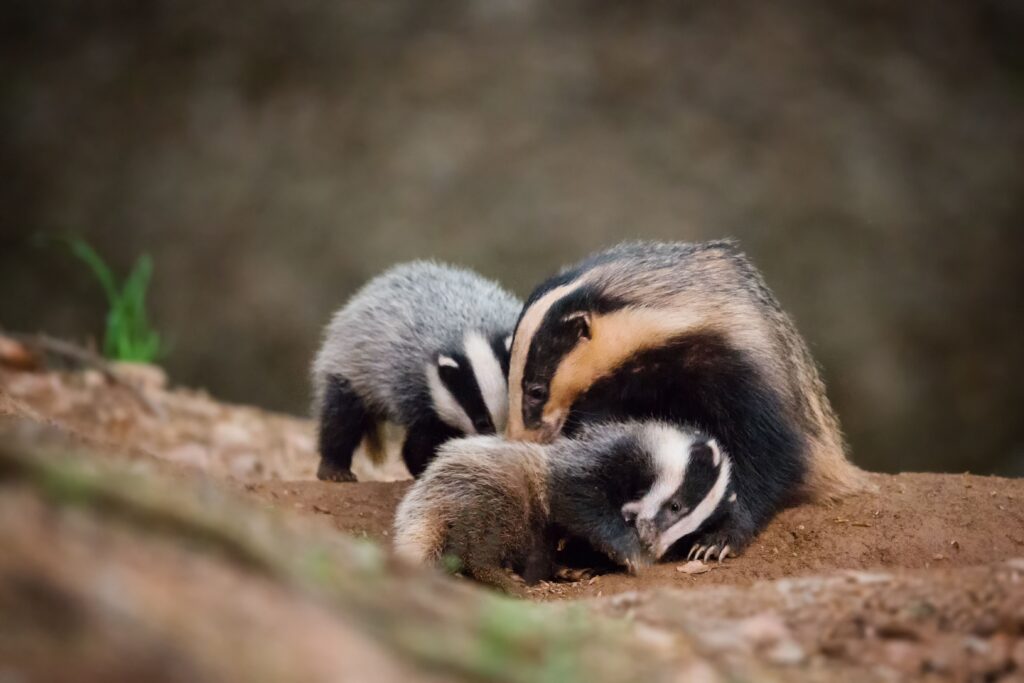Badger Baiting
At a glance
Badger baiting is a cruel and secretive bloodsport which, although illegal, is prolific in Britain.
Badger baiting usually takes place in the winter months, between November and March when sows are pregnant.

Across the UK, hundreds of men (typically connected with hunts and known as terriermen) travel to badger setts in remote locations every week, usually early in the morning or late in the evening, away from the public eye.
They then send their terriers down a sett to find a badger and attack it, either to draw it out or hold it at bay.
The dogs are usually fitted with transmitter collars, so the men know their exact location.
Once the badger is cornered by a dog, terriermen use spades to dig the poor animal out. The men then set their dogs on the badger, who will rip it up while it is still alive. The death is slow and agonising.
Sometimes the badger isn’t killed, and is sold to underground baiting rings.
To the baiters, badgers are seen as the ultimate fighting opponents. The animals are small but extremely tough, and will fight the dogs to the death: something the men take great delight in watching and boasting about to their friends.
Badger baiting usually takes place in the winter months, between November and March when sows are pregnant. Animal Survival International says:
“…during the cold winter months, [badgers] become defensive – ferociously protecting their homes when females are pregnant or nursing their young. Badger baiters exploit this defensive behavior which makes for ‘better sport’.”
In 2018, a BBC Wales investigation shed light on underground baiting rings. The programme shocked viewers with its undercover footage of horrific cruelty. The investigators infiltrated one group over a number of months by gaining access to their private Facebook groups. They then gained the baiters’ trust and were invited to join men in Wales, badger baiting and lamping. One terrierman, Jordan Houlston, was filmed setting his dogs on a badger. The BBC investigator said that he was “feeding the badger to his dogs”.
The undercover footage showed the men baiting in the Forest of Dean during cubbing season. Their dogs mauled a small badger cub. Still alive but fatally injured, one man clubbed the cub to death with a spade.
Cruelty to dogs
Badgers are not the only animals to suffer from horrific injuries, or even death, because of this disgusting ‘sport’.
The dogs, too, are victims.
Badgers have very powerful digging claws, and terriers often suffer from life-threatening injuries, which are usually stitched up by the hunters themselves because visiting a vet would be too risky for them; after all, what they’re doing is illegal.
In the BBC undercover footage, one baiter admitted that he and his friends shot their dogs if they hadn’t performed well while badger baiting. Vet Mike Jessop told the BBC:
“It’s of no surprise if the dog has reached the point of no benefit, that they will dispose of it the only way they know how. And that’s why their life expectancy is foreshortened, and why, once they’ve reached the end of their working life, they’re usually abandoned or killed.”
He continued:
“The dog is just another working tool. They’re just thrown down holes. They’ve got to do their job, if they’re not doing their job they become a useless commodity. They’re only useful to these people if they’re being pushed to the limit.”
Dogs are often kept in squalid, cold conditions, in kennels covered in faeces with little natural light.

Rare prosecutions and lenient sentencing
Convictions of badger baiters are rare. In 2018, the BBC reported that:
“less than 20 incidents of badger baiting and just four dug badger setts were reported in Wales over a seventeen month period.”
Of those who are prosecuted and convicted, the sentencing is unduly lenient and usually does nothing to stop the men from badger baiting again.
The Badger Trust argues that there is a “glaring inequality for crimes against badgers”. It states:
“Under the Animal Welfare (Sentencing) Act 2021, those committing the most serious animal cruelty crimes to a domestic animal in England and Wales can face prosecution with up to 5 years in prison. Similar animal cruelty committed against a wild badger can only be given a maximum of a 6-month prison sentence under the Protection of Badgers Act.”
The Trust is campaigning for the government to increase the maximum sentence for convictions under the Badgers Act to five years in prison.
One such example of lenient sentencing is that of Christian Latcham, who appeared in the BBC’s undercover footage. Latcham was previously convicted of badger baiting in 2011, and given a suspended sentence. He was banned indefinitely from keeping dogs, but, of course, this didn’t stop him from going about business as usual. After his conviction, he posted numerous photos in private Facebook groups of himself taking part in badger baiting. According to the BBC, Latcham boasted that in just one month, he had been on six digs with his dogs.
Latcham and three others who were covertly filmed during the BBC Wales investigation – Thomas Young, Cyle Jones Jamie Rush – appeared in Cardiff Crown Court in 2019, and were found guilty. They were each sentenced to between 20 and 26 weeks in prison. Jones had previously been sentenced to 18 weeks in prison for admitting unnecessary cruelty to his dogs.
Meanwhile, in February 2018, four people were convicted of badger baiting and animal welfare offences in Llandudno magistrates court, in what the RSPCA called a “landmark investigation”. After a five day trial, David Thomas, hunt master of the Dwyryd Hunt, and Jordan Houlston, terrierman for the same hunt, were found guilty and sentenced to just 22 weeks and 20 weeks respectively. Two others pleaded guilty and escaped prison, while charges were dropped against the remaining two. The four found guilty were all banned from keeping dogs for between four and eight years.
In November 2020, Damien Sweeney was was found guilty of 12 charges relating to badger baiting, again in north Wales. He was jailed for causing “gratuitous suffering” to badgers after horrific footage of his dogs tearing up badgers was found on his phone. His sentence was just 20 weeks.
And in August 2022, Rhys Davies, a former gamekeeper on one of Scotland’s most prominent grouse-shooting estates, pleaded guilty to a number of offences relating to animal cruelty, after he trained his five dogs to take part in fox and badger baiting in various locations. He incriminated himself after he sent graphic photos of himself badger baiting to get developed at a printing company. Davies and others were posing with spades for the camera, and a number of photos contained images of disfigured animals. The SSPCA was alerted by the printing company, and were granted a warrant to search Davies’ home. They found 11 dogs in kennels, some with terrible injuries from fighting badgers. They also found medication, syringes and staplers, showing that Davies was attempting to treat the dogs’ injuries himself. On top of this, they retrieved a phone with text messages on, where Davies had written about the fights that his dogs had been involved in.
Davies was sentenced to prison for eight months and banned from keeping dogs for 15 years. Meanwhile, Davies’ friend, Liam Taylor, walked away from Banff Sheriff Court in Aberdeenshire in November 2021 after his involvement in the same gang.
